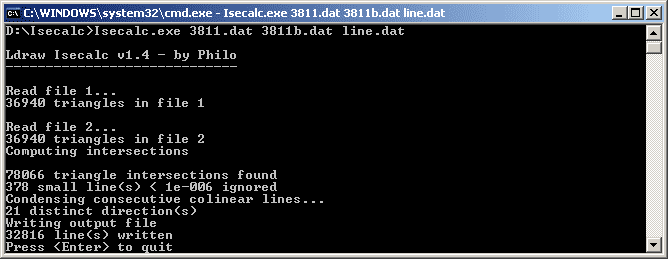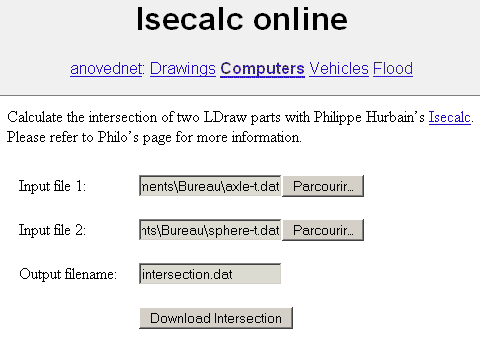![]()
![]()
![]()
![]()

- sphaxle.ldr contains a Technic axle stuck in a sphere primitive, slightly off-center.
- sphere-t.dat is the inlined sphere file.
- axle-t.dat is the inlined axle file.
- sphaxle.dat is the intersection line as created by Isecalc.
- sphaxle2.dat contains the intersection line with the original axle and sphere
- V1.1: Increase angle threshold value to improve line condensation.
- V1.2: Improved output file format (July 2008)
- V1.3: Increased array size for more triangles/lines (January 2009)
- V1.4: Used dynamic memory allocation for more triangles/lines (memory and patience limited only). Improved line condensation parameters for better results. (November 2011)
- Prepare the input LDraw files. Isecalc calculates only the intersections of triangles and quads. Other LDraw line types are ignored. If you want to compute an intersection with parts or primitives, they must be inlined down to triangles and quads. LDDesignPad does this very conveniently.
- Launch a command prompt
- Type the command line: Isecalc LdrawFile1 LdrawFile2 LdrawIntersectionFileOut. Isecalc will create LdrawIntersectionFileOut, containing the intersection line. Note that if file LdrawIntersectionFileOut exists it will be overwritten without warning.
- Isecalc output file with 6 digits after decimal point, this precision is excessive for most usages and values should be rounded. Here again, LDDesignPad does that very well.
- Both input files are read and parsed. Quads are split into 2 triangles. Quads with bad winding ("bow-tie") will not be properly processed. All triangle vertexes are stored in arrays.
- All triangles of one set are tested for intersection with all triangle of the second set. If an intersection line is found, it is stored in an array. The triangle intersection program originate in Tomas Möller thesis. Very short lines (length < 1e-6 ldu) are ignored.
- The lines are then sorted according to their direction, all lines with the same direction receive the same tag (angle tolerance is about 0.5°).
- Lines with matching direction tags are scanned for identical endpoints. In that case they are condensed in a single line if distance of removed endpoint to line is lower than 0.005 ldu.
- Output file is created.
|
Isecalc, Intersection Line Calculator

Isecalc utility computes the intersection line of two sets of triangles or quads. Each set is provided to the utility as separate LDraw files. A third file containing the intersection lines is created.
It is a simple console application, source code is provided below to anyone willing to integrate it in a more palatable interface. You may also use Michael Heidemann LETGUI front-end (highly recommended!).
Download
Isecalc package, including program for Windows Linux and Macintosh, documentation, source files (Visual C++ 6.0) and the following sample files:
Note: Macintosh version (universal binary) courtesy of Jim
DeVona
Note: Linux version courtesy of Mufti
History
Usage
Here is a screen shot of a sample run:

If you don't like command line, you will prefer Jim DeVona's Isecalc online version:
How Isecalc works
|
![]()

![]()
![]()
![]()


